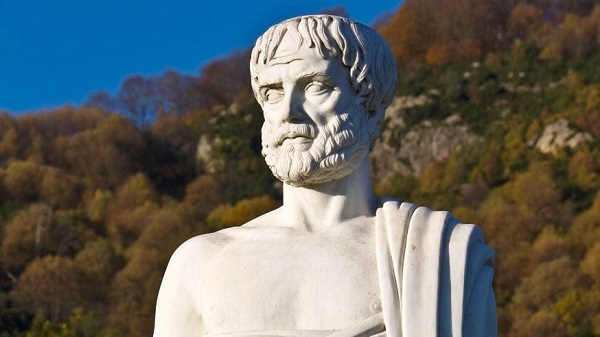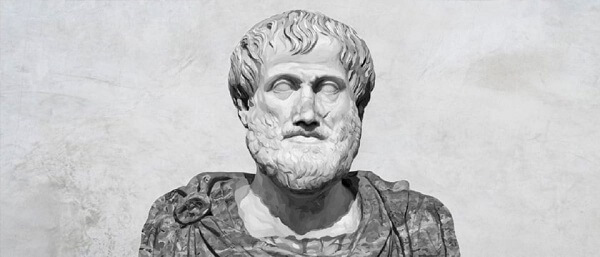Aristotle
He was an academician, thinker, and scholar, considered one of his time's greatest philosophers. Plato was his teacher, and his student was Alexander the Great. He developed his school (Lyceum) in Athens, and there he devised significant and path-breaking scientific, philosophical, and political theories which had immense relevance in his age and became the source of new scientific inventions and theories in later days. Aristotle significantly contributed to ethics, politics, nature, and logic and devised a new system to classify plants and animals. He was instrumental in devising important theories in physics and philosophy. He is deeply appreciated for devising deductive reasoning, a form of logic widely used in business, finance, science, and various modern processes.
Early Days
He was born in Stagira, Macedonia, a seaport on the Thracian coast. He was born in 384 BCE. Aristotle's father, Nichomacus, a physician, was giving personal service to the King of Amyntas of Macedonia. His father departed when Aristotle was very young. He is guardianship fell into the hands of Proxenus. Aristotle was sent to Athens to complete his studies at the age of 17 at the insistence of Proxenus. After reaching Athens, he learned at the institution of philosophical learning, also called the Academy. It was established by Plato, who Socrates had taught. Aristotle was present there till Plato's demise. Aristotle proved to be an outstanding student and started giving lectures on rhetoric. Plato had a great reputation and a solid image, but Aristotle disagreed with Plato's thoughts. When the time came to choose Plato's successor, he succeeded and was chosen over the nephew of Plato. The kings of Assos and Atarneus invited Aristotle to Mysia to be part of their court. Aristotle stayed in the Mysia for three years, and during this time, he tied the knot with Pythias, the king's niece. Persians attacked the Hermeas in the third year, and Aristotle left the country and headed to the island of Lesbos. Aristotle and Alexander the GreatKing Phillip II of Macedonia requested Aristotle in 343 BCE to teach his son Alexander. Aristotle agreed to his demand and tutored him closely for seven years; who knew at that time this man would be known as Alexander the Great. Alexander was coronated as king at the end of seven years, and Aristotle's job was also completed. Aristotle left Macedonia but remained in close contact with the young king. Aristotle's teaching greatly impacted Alexander, inspiring him to be affectionate for arts and literature. The Lyceum and Peripatetic PhilosophyAristotle came back to Athens from Macedonia, and he developed the Lyceum. It was a school that put challenged Plato's school, the Academy. Aristotle said that it is possible to figure out the end causes and purpose of existence and that it is possible to determine these causes through observation. This philosophical idea is called teleology and is a significant concept used to dominate the Western world. He bifurcated the study of philosophy into three areas: productive science, practical and theoretical. Productive philosophy deals with agriculture, crafts, and arts. The practical study of philosophy contained physics, biology, and mathematics. Theoretical Philosophy contained the study of the soul and metaphysics. During his classes, he would repeatedly walk back and forth around the Lyceum's exercise grounds. Later, this habit became the idea for the term "walking around the philosophy". Aristotle, during this time, wrote some of his significant works that had a deeply profound impact on philosophical thinking. Simultaneously, his students did various philosophical and scientific research and founded a huge library. He continued teaching for 12 years at the Lyceum to choose his favorite students, and Theophrastus succeeded in this. The Demise of Aristotle
Alexander the Great departed from the earth in 323 BCE, and the assembly in Athens declared battle against Antiphon, Alexander's successor. They thought of Aristotle as pro-Macedonian and anti- Athenian; therefore, they alleged them with impiety. Remembering Socrates's fate, who was given death, Aristotle decided to put himself in exile to Chalcis. He died at the age of 63 there due to a digestive ailment in 322 BCE. LegacyHis logic, metaphysics, ethics, politics, science, philosophy, and system of deductive reasoning have undetachable parts of the modern study of science, and his ideas and thoughts are significant. His ideas have a profound impact on the modern world. Aristotle's BooksAristotle has written around 200 books, and they have been written in the form of manuscripts and notes that touch upon subjects like psychology, reasoning, politics, rhetoric, ethics, politics, and science. They comprise records of systematic works and scientific observation. Theophrastus, a student of Aristotle, passed this material to his student Neleus and he kept it in the secured vault to shield them from moisture and shifted to Rome; Scholars used this for their reference. Of 200 books, only 21 are in circulation. The majority of the work dates back to his time. PoliticsIn politics, Aristotle studied human behavior regarding government and society. Aristotle thought that the state aims to make it possible for citizens to attain happiness and virtue. It also tries to analyze the existence of cities into being, the role of politicians and citizens, wealth, and the class system. He also tried to understand the forms of governments and democracies, the aim of the political system, and the role of women and slavery in society and households. MetaphysicsAristotle, in his book Metaphysics, differentiated between Matter and its form. According to Aristotle, Matter is a physical substance, and the form is of the unique nature of a thing that serves as its identity. "Nicomachean Ethics" and "Eudemian Ethics" The work has been done in tribute to the son of Aristotle and framed a moral code of conduct for good living. He stressed that good living to some extent, will not abide by the restrictive laws of logic, and the original world will have some instances that will show the conflict of personal ideas. He said the onus lies with the individual to make a careful judgment. Eudemian Ethics is another major work of Aristotle that advocates judgment and behavior to achieve "Good Living". RhetoricAristotle examined and observed public speaking with scientific value in pursuit of teaching the reader how to be an effective speaker. Aristotle stressed that rhetoric is needed in law and politics and aided in securing justice and truth. Aristotle advocated that good rhetoric could help educate people and incentivize them to see both sides of the debate and discussion. Aristotle attempted to find how to develop an argument that would be a sweeping and maximum effect. Prior AnalyticsAristotle attempted to explain Syllogism. He described it as "a discourse in which certain things having been supposed something different from the supposed results of necessity because these things are so". He tried to explain the essential reasoning components of exclusive and inclusive relationships. Contributions to the ScienceHe has written a book on astronomy that includes, On the heavens and earth and earth sciences. He also attempted to study Meteorology. He expanded the definition of Meteorology. Earlier, the study of meteorology means simply the study of weather patterns. He recognized the water cycle's role and discussed in depth the topics from astrological events and natural disasters. His views were very much contested but laid the foundations for further studies. Contributions to the PsychologyAristotle has thrown light on Human psychology, and his writings on how people perceive the world continue to serve as the foundation of modern and advanced psychology. Aristotle's work on PhilosophyHis contributions to philosophy have impacted and influenced many people, and his major work in philosophy was his systematic concept of logic. He tried to devise reasoning as a tool for humans to learn conceivable ideas. He tried to describe objects based on their action, state of being, and characteristics. In his philosophical treatises, Aristotle also discussed how a human could collect data about objects by deduction and reference. Contemporary philosophers use the theory of deduction as the basis, and in a contemporary context, they call it Syllogism. Biology and the AristotleAristotle did not consider a scientist, but he studied, researched, and experimented with science and its theories in depth and at great length. Aristotle believed that education could be attained from a physical object through interaction. Aristotle identified that personal associations and human interpretation play a key role in interpreting those objects. He studied and researched the science that includes biology as well. He took an effort to differentiate between animals and humans based on genera and similar characteristics with marginal error. He went a step further in classifying animals into species. He differentiated based on blood. Those species contain red blood, and those that have not. He labelled those animals with red blood as vertebrates and bloodless as cephalopods. These classifications were inaccurate, but still, it was used for 100 years as a standard system. Aristotle was also fascinated by marine biology. Using dissection, he closely studied the anatomy of the marine creatures. Observations he made about the marine life written in the books are more accurate in contrast to the observation he made in the biological classification. InfluencedAristotle, after the death of 2300 years, his ideas, theories, and beliefs still dominate the world and influence and impact many people. He has touched upon every sphere of human knowledge and has contributed immensely to it. He founded formal logic and championed the study of zoology. He has founded many areas of research. Theophrastus had written History of Plants, valuable work in botany. His biological work is still in use, like the word carpel and pericarp, which came from carpos and pericarp, respectively. His students were Harpalus Hephaestion, Eudemos of Rhodes, Aristoxenus, Dicaearchus, Aristoxenus, Demetrius of Phalerum, and Mnason of Phocis. Aristotle himself was influenced by Epicurus, Plato, and Empedocles. He deeply influenced Alexander the Great. He learned Persian from his teacher, who told him about their traditions and customs. Modern Writers Were Influenced by the work of Aristotle
Aristotle's Notable Ideas
Next TopicYashwant Sinha
|
 For Videos Join Our Youtube Channel: Join Now
For Videos Join Our Youtube Channel: Join Now
Feedback
- Send your Feedback to [email protected]
Help Others, Please Share









